GENTLE, POSITIVE WEANINGWhile the word "weaning" often conjures up images of wailing babies and swollen, painful breasts, gentle, baby-led weaning is often so gradual and natural a process that mother may not even remember the exact day or even week that her little one weaned from the breast. Gradual weaning is gentler on both mother and baby. I use the term "positive weaning" to describe this style of weaning. Instead of abruptly removing a child from the breast, positive weaning is a mindset that respects the child's developmental readiness and views weaning as a process. Being "fully weaned" is a milestone and achievement, like mastering how to use the toilet, learning to ride a bike, or learning to read. Positive weaning also respects the mother's needs and bodily integrity, since the process of weaning may often be the child's first exposure to the idea that each person's body belongs to that person, and their first experience of respecting that others can, and will, say "no" to him or her on occasion. These important lessons have many benefits for the child long into the future. INFANT MASSAGENo matter how they are fed, newborns benefit from infant massage as they transition from womb to world. For a young child, touch is as vital to life as milk. Infants who regularly receive infant massage cry less, develop faster, and have fewer discomforts. Infant massage is a wonderful way to encourage your baby's health and well-being while bonding with your child. JOYFULLY WELCOMING A NEW SIBLINGFor many children, their special time as the "baby of the family" will come to an end when a new sibling arrives. The uncertainty of how their child will handle this transition is often a source of considerable worry for parents during pregnancy. Often in books or shows on this topic, the older sibling is portrayed as jealous and the parents or grandparents as only interested in the new baby, and in my opinion, these negative depictions plant seeds of worry and pessimism in the older sibling that may contribute to a long-term "sibling rivalry." My own experiences as a mother of seven have taught me that this transition is easier on the new big brother or sister when the older child is involved in the pregnancy; for example, attending prenatal care or ultrasound appointments; looking at ultrasound photos together; or helping to pick out clothing or prepare the home for the new baby. It is beneficial if there have been age-appropriate discussions of the birth process and birth plans; as well as frequent discussions of what they can expect of a newborn, and how Mom, Dad, and Big Sister or Brother will care for the baby...all with a positive, excited attitude. During the typical challenges of pregnancy, and especially if complications arise during the pregnancy or birth, it is best to talk with your child in an age-appropriate way about what is happening to mommy or baby and how they can help, even if in very simple ways, like, "Please bring Mommy a glass of water." When the child does these precious acts of service, praise the child, letting him or her know what a great big brother or sister he / she already is. Empathy, gentleness, education, and encouragement will go a long way toward helping the young child to embrace this new role that, God willing, will last a lifetime. SCBP RESOURCES
0 Comments
8/12/2021 supporting new MOTHERs during a loCkdown: a guide for friends and extended familyRead NowThe coronavirus pandemic has changed life as most of us once experienced it. Many areas of the world are in lockdown, and even in areas where things have opened up, as the number of COVID-19 cases spikes again, we will likely face more social distancing measures or quarantines to try to slow the spread (if we aren't already). For some new mothers, this slower, more home-based pace of life has been a good thing. These moms report that being quarantined with their babies has helped them breastfeed, since - just to mention one thing - being separated from a nursing baby tends to make maintaining a milk supply more challenging and if nothing else, lockdown gives us lots and lots of time with our immediate family members. But in other and important ways, social isolation is not great for new mothers. Many important services that mothers need, including lactation help, have been more difficult or impossible to access during lockdown. Aside from access to healthcare, all mothers need other mothers, friends, sisters, cousins, grandmothers, aunts...we need our sisters and our sage femmes to let us know we're not alone; we're loved; we're doing a good-enough job; our kids are normal (usually); and, if they're not, to have faith that eventually, this too shall pass. Lockdowns put a lock on these face-to-face and side-by-side moments...natural social interactions which normally serve to lower our stress levels and restore us - "enhope" us. And all this goes quadruple for new mothers. Dealing with lochia, sore nipples, night feeds, blow outs, the constant guessing games that a newborn brings (a/k/a no instruction manual), keeping a brand new non-verbal human thriving and growing, and caring for everything "down there" is just a lot. In some idealized past, we imagine our ancestral mothers got to lie around while their loving, supportive kin waited on them hand and foot. Sure, maybe that happened sometime, somewhere, but envying our long-departed great-great-grandmother's "lying in" is not really going to help you get through this painful feed, on this lonely day, at this ungodly hour. So let's break this down. New mothers have physical needs. Food, water, monster sized maternity pads (in the beginning), menstrual pads later on, baths or showers, and (eventually) clean clothes. If you love her, ask about these things. If she needs something, help or ask someone else to help. Leave things on her porch, in her mailbox, send it unaccompanied up the elevator, or throw it through her window if you have to! (Or you could just give to the baby's dad, but that's not as fun.) If she's good with her physical needs, I guarantee she has emotional needs. Call and ask about her birth. Listen. Bite your tongue if you find yourself starting any sentence with the words "at least." Listen. Celebrate the good stuff with her. Mourn with her anything she found sad. Share her anger if anything made her mad. Don't tell her what she should have done differently. Listen. Are you listening? Keep listening. No matter what, make sure to let her know how amazing she is. No one in the history of the world had her birth. It was her adventure and she is a heroine for having done it! Call another time and ask how things are going with the baby. Celebrate the joys. Mourn the things that aren't going so well with her. Did I mention don't tell her she should have done anything differently? She is probably already beating herself up about something. If her baby is growing and developing, she's doing a great job. Tell her. If her baby is struggling, offer to help. If she's got other kids, depending on your local situation, you might be able to have someone in mom's social bubble bring the baby's older siblings somewhere outside for a socially distanced / masked playdate so she can visit (whether in-person or virtual) with the doctor, or the chiropractor, or the lactation consultant, or whoever it is she thinks can help. Moms grow in confidence and feel capable when the people around them support their decisions about their baby's care. Be that person (even if you secretly disagree). Being a great friend / sister / mother / mother-in-law, etc., means supporting the new mom's efforts to become a mother, a big part of which is taking responsibility for her baby. And chances are very good that if the baby continues to struggle, even after that visit with [insert name here] she will try something else, and something else, and something else, and maybe, when she's tried everything else, she may even ask you for your advice! Now is your moment. A few days or a week later, call her again. And then again. And yet again. And pretty soon she will blossom and her tiny baby will become a chunky monkey, roll over and crawl and take his first steps, and life will settle and she will never forget that you were there, on the sidelines, cheering her on the whole time. Maybe you never carried a meal to her bedside on a solid-gold tray, but you were there. And maybe she'll tell her great-great-granddaughters about you and how you were there for her when great-grandpa was born, during the time of the world coronavirus pandemic. ways st. croix birth & Parenting can help
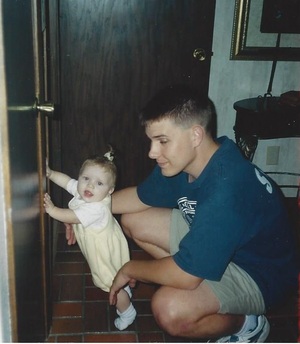 Chris & E-R shortly after his AK trip Chris & E-R shortly after his AK trip When our eldest daughter was nine months old, Daddy went to Alaska for his annual commercial salmon fishing adventure...er...business trip. The trip was to last for four weeks. The change in our normally exceedingly placid daughter was astounding. For three days, she cried inconsolably. We far underestimated how important her father was to her, even at such a young age. Needless to say, that was the last time Daddy left for such a long time. When Daddy finally returned, I took her to the airport to pick him up. I remember in vivid detail what happened next. He greeted us in his usual exuberant way. Ready to be done with my "adventure" in single parenting, I was thrilled to see him. She just looked at him for a brief moment and lost interest. She had forgotten her own father in four weeks. He sat next to her car seat on the trip home. He started joking and playing with her. Her eyes suddenly sparkled with recognition; one might even say with amazement. Sometime in that trip home from the airport, she realized that her long lost daddy had returned. According to CDC data from 2001-2006, Minnesota ranked as the sixth lowest state in the Union for maternal mortality, with 5 maternal deaths per 100,000 liveborn infants. Wisconsin’s rate was over double Minnesota’s with 10.9 maternal deaths per 100,000 liveborn infants, putting Wisconsin in the lower half of the states at 29th lowest. Compared to a maternal mortality rate of 12.1 for the United States as a whole, both Minnesota and Wisconsin are doing maternal health care rather well. But compared to the Healthy People 2010 goal of no more than 3.3 maternal deaths per 100,000 live births, both states have room for improvement. Recently, a 32 year old Minneapolis woman with a two week old infant suddenly died of unknown causes, though the death may have been related to a blood clot. Her sudden loss leaves a terrible hole behind in her family and community, and her loss is also experienced by her infant. 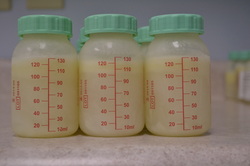 While, thankfully, most of us will not personally experience maternal mortality among our family or friends, it is important to be prepared should it occur. Those surrounding this Minneapolis family have rallied to their aid, offering practical help including breast milk donations. Offering mother’s milk cannot begin to fill the hole left by the death of the baby’s mother, but it does provide practical "next best" nourishment for the child, and no doubt eases the emotional strain on the surviving family. For those interested in learning more about donating breastmilk (though not directly to this family)—or those who need to be on the receiving end—the Health Foundations Family Health & Birth Center takes and offers donations, as does the University of Minnesota Medical Center, Fairview. Several other groups that have local chapters for milk sharing are Eats on Feets and Human Milk for Human Babies. Donors are most often breastfeeding moms who pump or express milk above their own baby’s needs, milk that can be shared with another baby. A less commonly known source of breastmilk is the mother who has lost a baby. It is possible to pump or express and collect milk for a time to donate to another baby in need, a gift known as “Legacy Milk.” For more information, please contact me. 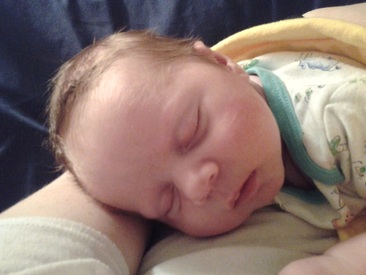 While her milk is invaluable to her baby, a mother is more than just a source of food and comfort. Even very young babies grieve the loss of those closest to them. All babies, especially very young ones, need lots of holding and attachment. For babies who have lost a mother or father, this need is even greater. It is ideal if another person can take up where the mother was forced to leave off due to her unexpected passing away—helping the baby to bond with one other person is key to the baby’s normal emotional development. The infant will need lots of holding and skin-to-skin contact. Swaddling and infant massage will also help baby to feel more secure during this difficult time. Talking with the infant about what happened is important; even if he or she does not understand the meaning of the words, the tone of understanding that baby misses his or her mother and your desire to be a source of comfort will come through loud and clear. It is said that the hardest thing a parent can endure is the loss of a child. It is not as commonly said that the hardest thing a child can endure is the loss of a mother (or father). Simply because a person cannot express his or her sorrow in words does not mean it does not exist. Baby may express his grief in long bouts of crying, or in sleeping more—or less—than usual, or changes in feeding patterns. While it is crucial that the very young baby form a close attachment to one person, it may feel overwhelming for a widower to cope with these changes in the baby’s behavior in addition to dealing with his own grief. Friends and extended family can be a real blessing if they pick up the slack and spell the surviving parent or other caregiver with the tasks of feeding, holding the baby, changing diapers, giving the survivor an opportunity to shower or eat a meal, providing meals, housecleaning, or helping with the care of older children. Simply knowing that you are praying for them will give them courage and hope. Surrounding the infant and his or her family with love and support is an invaluable gift that will help the family—and the baby—to recover in time. The family will never be the same as it was before, but it will develop a new normal and can grow strong again. For More Information: Alan D. Wolfelt, Ph.D., Helping Infants and Toddlers When Someone They Love Dies
The one and only reason we even knew about attachment parenting in those early days was exposure to these ideas through the Couple to Couple League, the organization that taught us Natural Family Planning. Although CCL has changed, at that time, it was heavily influenced by La Leche League and its teachings about "natural mothering." While CCL wasn't the only voice promoting 'natural mothering,' it was the only one in our circles. While the Couple to Couple League may have distanced itself from "natural mothering," there are now many other voices advocating attachment parenting in general, or aspects of it: notably, Dr. William and Martha Sears, Mothering.com, Dr. James McKenna, the La Leche League, Attachment Parenting International, Dr. Nils Bergman, and Dr. Jack Newman. Notice all the doctors in there? Attachment parenting is no longer the exclusive territory of hippie housewives. (Maybe it never was, but it is good to see all the amazing docs out there finding the research and doing the writing and promoting to support the fact that mothers and babies are meant to be together.) I'm a firm believer that parents have been given, by God, the right and the responsibility to raise their children in the way that seems best to them, in their circumstances, with their unique mix of personalities, resources, community and culture. It saddens me just as much now as it did back then, that simply because I might choose to parent my child a bit differently than someone else, this may somehow be perceived as a judgment against them. I believe that most parents are doing the best they can raising their children, using the information and resources they have.
The Searses teach what they call the seven "b's" of attachment parenting: birth bonding; breastfeeding; babywearing; bedding close to baby; belief in the signal value of baby's cry; beware of baby trainers; and balance. If you are curious about any of these aspects of attachment parenting (or all of it!), what follows is my review of attachment parenting, as used within our family for the past thirteen years. 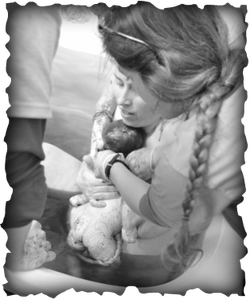 The Joyful Moment just after birth The Joyful Moment just after birth Birth bonding? I've done it six times! This one is pretty well accepted in American society, at least for vaginal births. But in case you've just emerged from subterranean life, bonding at birth makes breastfeeding easier and positively impacts the relationship between mother and baby for years to come, as well as helping to prepare your baby for healthy relationships with others. Having a doula present at your birth and after can be a great resource in helping you bond with baby, both because she can give you helpful bonding tips, as well as run errands so you and your spouse can focus on getting to know your baby. Most articles about birth bonding are quick to point out that missing bonding at birth doesn't doom you to a distant relationship with your child or curse your child to become the next dictator. So what to do if you miss that early bonding? Well, besides this little hug, pictured at the left, I missed early bonding with my little son, who had serious complications at birth and spent his first fifteen days in the NICU, only able to nurse for the first time about a week after birth. I am delighted to say that we both persevered and he's a happy, healthy, exclusively breastfed baby today. The keys to bonding with your baby, despite a delay, are to touch or be near your baby consistently, to talk with your baby, to be responsive to baby's cues, to get good support when your baby is ready to try breastfeeding, and to negotiate with your baby's health care providers for what's important to you, if need be. 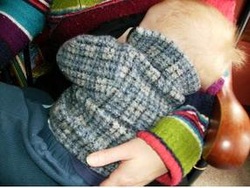 Discreetly nursing one of my little ones Discreetly nursing one of my little ones Speaking of breastfeeding, yeah; it's amazing! I LOVE it and have breastfed six babies (in staggered shifts--not all at once!) for over 13 years, with only two breaks of about six weeks each when two of my children weaned at the end of a couple of my pregnancies. Pacifiers have been unnecessary, although I would admit that we've discovered their usefulness in the car with our sixth baby. ;) On the topic of pacifiers, It was the Couple to Couple League who first introduced us to "ecological breastfeeding," or what I call "natural breastfeeding." In a nutshell, natural breastfeeding is nursing your baby without the use of artificial nipples, with responsiveness to baby's cues, day and night. There are advantages to natural breastfeeding, as well as some cons, and this important, neglected topic is one I will address soon in another blog post. If you want tips for getting a good start or need help, attending a local La Leche League meeting is a great idea. I am also available as a peer counselor and experienced nursing mom! 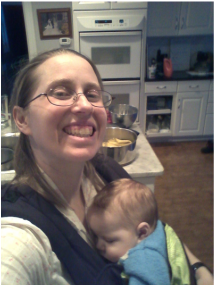 Preparing supper while holding baby! Preparing supper while holding baby! Babywearing? I can't get enough. I have worn my babies in backpacks, slings, frontpacks, and now, my brand new soft structured Boba. It's not only cuddly and sweet to wear your baby, it's the only way a busy mom can get things done, if you choose not to use swings or other baby gear! Here a shout-out to Baby Wearing International is appropriate. BWI has local chapters, including one in the Twin Cities area, where you can go and try on and even check out carriers before investing in them. What works for another mom and baby may not work for you at all, depending on body sizes, baby's age and stage of development and the reason you need or choose to babywear at any particular moment. BWI meetings are also a great opportunity to meet other AP moms, especially if you live in an area where attachment parenting isn't common. 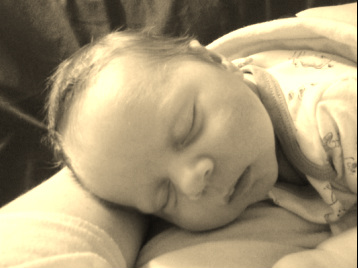 First time I got to hold this sleeper without his feeding tube First time I got to hold this sleeper without his feeding tube Bedding in? I adore cuddling with my sleeping baby or toddler. Our children have been and continue to be consistently great sleepers at night, unless they are sick. Thus far, among our six kids, we have had no bed wetting and no night terrors, including our kids who have graduated from the family bed. And to clear things up--no; we don't continue to sleep with our children forever! The exact age of weaning from the family bed has been different with our various children, but regardless of age, we take as much pride in our children developing night-time independence as we do when they take their first steps, or say their first sentence, or paint their first piece of art.... Night-time independence happens gradually and naturally. Just as a child doesn't go from crawling to walking flawlessly in one day, night-time independence is a gradual process, as the child learns to sleep more deeply, to hold his bladder, how to cope with scary dreams, how to cope with the different sights and sounds of night, etc. It's a lot to learn and we as parents need to be patient and trusting as our children move through this process. Safety concerns? Click on the Dr. McKenna link above. While we do practice the family bed, safe bed sharing is important; and bed sharing is not for everyone. Many people find sleeping with baby in a sidecar arrangement (with a co-sleeper) works better for their family than bed sharing. Concerns about intimacy? We have six kids, people. Need I say more? Responsiveness to baby's cry? Yep. With our first, I responded at the first teeny whimper. Demands on my time are a lot more now than they were then, so it's true that I am not as much of a helicopter mom now as I was then. Yet if I do fail to reach the baby before he is crying, I like to hold him and validate his feelings of fear or sorrow, with words, sounds and body language meant to convey, 'I am here now; you are safe.' 'Beware of baby trainers.' This is simply the old old idea of letting the baby cry it out to train the baby to either stop using crying as a method of communication altogether because nobody is ever going to come, or, more commonly, letting the baby cry it out to train the baby to sleep through the night. Either way, the idea is to let the baby cry without picking up or sometimes even going to the baby. Keeping in mind my statement above about the fact that I truly believe that God gives a particular child to a particular family, and parents need to decide what type of parenting is best for their family, I do take issue with the cry it out strategy because it is rude. I wouldn't simply stand there while an older friend or family member were crying. I would at least attempt to help them or comfort them in some way. I fail to see how ignoring the tears of a very young person is any less rude. Enough said. 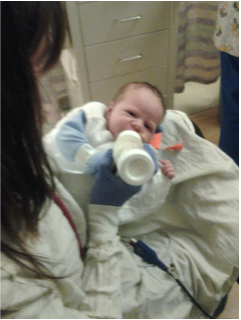 Baby getting his first bottle at age 9 days. Baby getting his first bottle at age 9 days. Finally, balance. This one eluded me till I was debilitated by postpartum anxiety, when we only had little ones in the house. It is hard for us perfectionistic moms to realize the following:
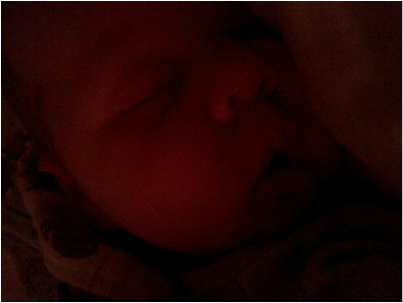 With my baby and my preschooler asleep on either side, I am grateful especially to Sheila Kippley, one of the founders of CCL, now of Natural Family Planning International, for this quiet moment of beauty. It wouldn't have happened without her. It is my hope that I too can leave a legacy of quiet moments of beauty in the lives of my own children, and in the lives of other families I have been given the privilege to touch, whether in person or through the written word. I would love to hear how AP has influenced your life; contribute to the conversation by making a comment! Health Foundations Birth Center (St. Paul, MN) recently published a great list of local, regional, and national organizations ready to help families facing loss. To add to their list, please keep in mind St. Croix Birth & Parenting. The Tiny Treasures Love Cupboard is now open! A Love Cupboard is a clothing donation program for families experiencing loss, run by volunteer coordinators, and sponsored by Stillbirthday. What will families find in the Tiny Treasures Love Cupboard? Families facing and experiencing loss will find a variety of hand-made tiny/micro-preemie, preemie, newborn and small infant clothes and baby blankets in both gender-neutral, boy, and girl styles, made by Team Tiny Treasures, a group of talented volunteers who knit, crochet, and sew. The clothes can be used in the interim, if the length of the baby's life is uncertain; or to dress the baby after he or she has passed away. We also provide maternity clothes for families facing financial difficulties--common when your pregnancy is high-risk. Here are some examples of lovely donations available now to receiving families, and made by members of Team Tiny Treasures: 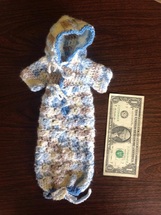
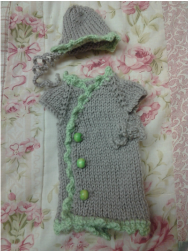
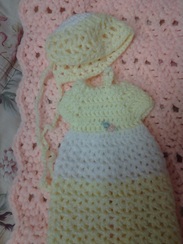
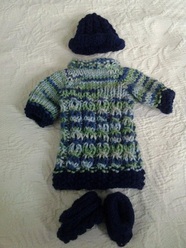
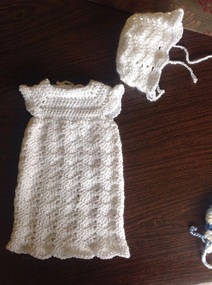
Team Tiny Treasures would love to expand! We are especially looking for additional seamstresses who can make bereavement diapers and tiny shrouds/wraps for miscarried babies. We are also in need of additional crocheted burial cocoons. Patterns are available from St. Croix Birth & Parenting. We would especially love to welcome jewelry makers who would be willing to make matching mom/baby bracelets. If you aren't the crafty type, financial gifts are always welcome which we will use to purchase items for memory baskets or to ship items to families who are located out of the area, or families who cannot visit the Tiny Treasures room. Gifts of new or like-new baby clothes up to size 0-3 months and gently used maternity clothes are also welcome! Contact us for more information, to volunteer, or to donate items.
|
Details
Archives
November 2023
Categories
All
Enter Your Email Address to get St. Croix Birth Blog Posts in Your Inbox(We don't collect your email address and you won't get anything else from us.)
|
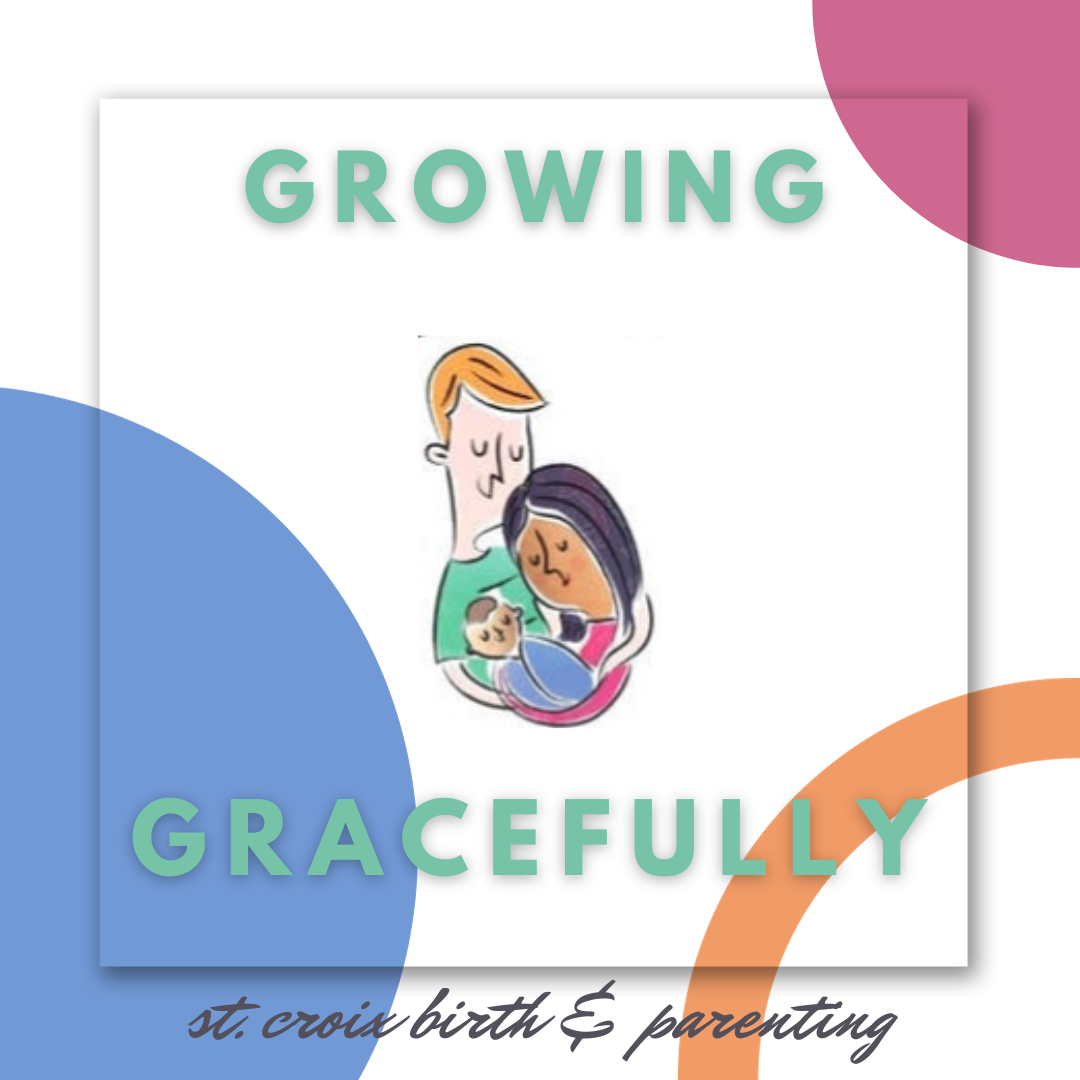
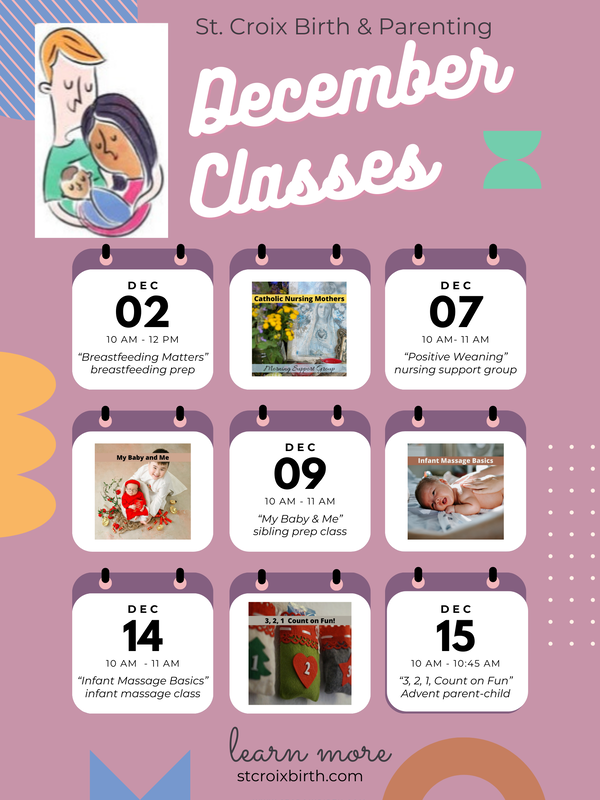

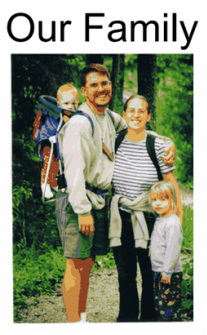
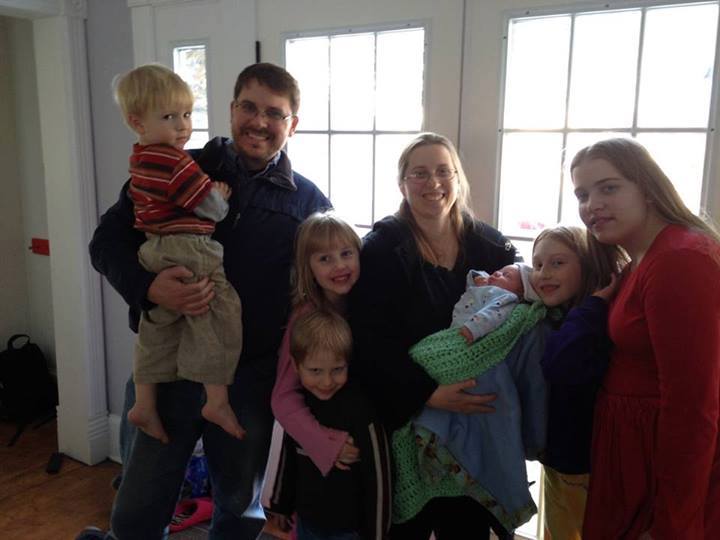
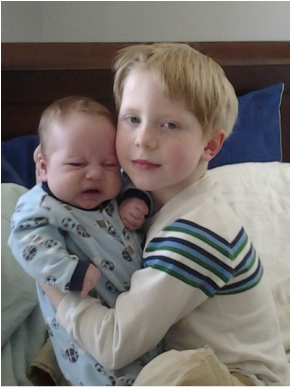

 RSS Feed
RSS Feed